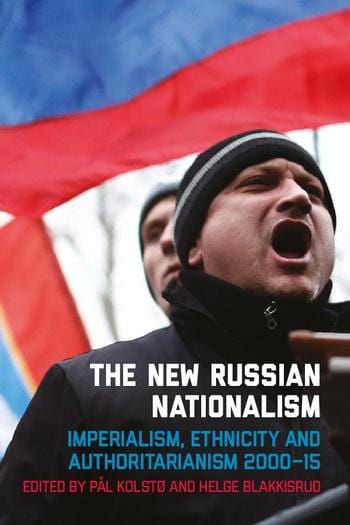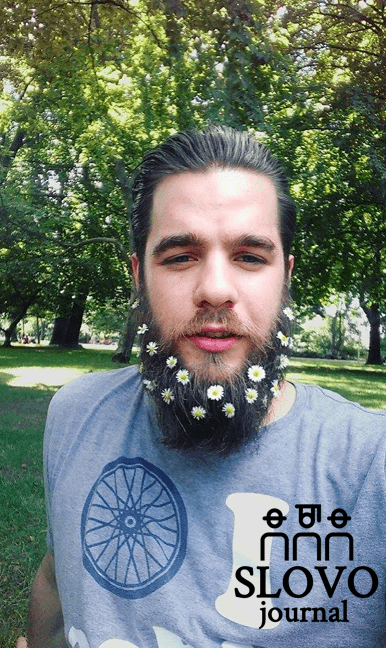Rachael Horwitz: New Russian Nationalism
By Borimir S Totev, on 27 July 2017

Rachael Horwitz, author of the book review of ‘The New Russian Nationalism: Imperialism, Ethnicity and Authoritarianism 2000-2015’.
Rachael is an IMESS student at the School of Slavonic and East European Studies, University College London studying Politics and Security. She is going to Moscow at the end of August as part of her programme’s second year. Rachael is interested in nationalism and the Ukrainian conflict, and is hoping to pursue a PhD in the field. She is a keen writer and loves watching films, outside of academia, Rachael enjoys horror and science fiction. To discover more of Racahel’s fiction writing, visit her blog here.
Her book review publ ished in SLOVO Journal VOL 29.2 discusses the 2016 study of ‘new’ strains in Russian nationalism and their relationship with the Russian state, as well as influence on public opinion. The study looks at how nationalism has impacted various aspects of contemporary Russian life, from attitudes towards the church to views on migrants. This useful and timely volume covers the growth of Russian nationalism from 2000 to 2015. It was in the process of completion during the annexation of Crimea in March 2014 and thus most of the chapters refer largely to events prior to that date, with some analytical coverage of how Russian nationalism has shaped public opinion of the annexation and subsequent Eastern Ukrainian conflict. It is thoroughly researched and yet accessible to the general reader, though with a few minor issues. The collection aims to explore the different currents within contemporary Russian nationalism, analysing their complex relationship with the state and Russian society. It is an anthology, with different chapters, which offer contrasting and sometimes contradictory perspectives on the issue of Russian nationalism. The book is divided into two main sections, with the first describing what Kolstø calls ‘society-level’ Russian nationalism, while the second is devoted to nationalism at state level and the changing discourse of Putin and the state in relationship to national identity. The final chapter is a discussion of nationalist economic policy in Russia and the debate at the state level between adopting protectionist policies or a more globalised economic model. This echoes current discussions in the West over pro-business policies such as privatisation, which have been blamed for creating a ‘left-behind’ class and fuelling sympathies for nationalist rhetoric, and underlines that Russia faces many of the same issues as Western countries in its approach to these issues.
ished in SLOVO Journal VOL 29.2 discusses the 2016 study of ‘new’ strains in Russian nationalism and their relationship with the Russian state, as well as influence on public opinion. The study looks at how nationalism has impacted various aspects of contemporary Russian life, from attitudes towards the church to views on migrants. This useful and timely volume covers the growth of Russian nationalism from 2000 to 2015. It was in the process of completion during the annexation of Crimea in March 2014 and thus most of the chapters refer largely to events prior to that date, with some analytical coverage of how Russian nationalism has shaped public opinion of the annexation and subsequent Eastern Ukrainian conflict. It is thoroughly researched and yet accessible to the general reader, though with a few minor issues. The collection aims to explore the different currents within contemporary Russian nationalism, analysing their complex relationship with the state and Russian society. It is an anthology, with different chapters, which offer contrasting and sometimes contradictory perspectives on the issue of Russian nationalism. The book is divided into two main sections, with the first describing what Kolstø calls ‘society-level’ Russian nationalism, while the second is devoted to nationalism at state level and the changing discourse of Putin and the state in relationship to national identity. The final chapter is a discussion of nationalist economic policy in Russia and the debate at the state level between adopting protectionist policies or a more globalised economic model. This echoes current discussions in the West over pro-business policies such as privatisation, which have been blamed for creating a ‘left-behind’ class and fuelling sympathies for nationalist rhetoric, and underlines that Russia faces many of the same issues as Western countries in its approach to these issues.
The book review for ‘The New Russian Nationalism: Imperialism, Ethnicity and Authoritarianism 2000-2015‘ by Rachael Horwitz (The School of Slavonic and East European Studies, University College London) was published in SLOVO Journal, VOL 29.2, and can be read in full here.
Posted by Borimir Totev, Executive Editor of SLOVO Journal
 Close
Close



